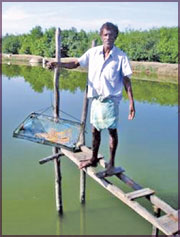Shrimp cultivation threatens environment - Study
The cultivation of shrimp and fish in tropical coastal areas is often
described as an environmentally friendly way to alleviate poverty, but
this cultivation has negative consequences for both the local population
and the environment, Daniel A. Bergquist of Uppsala University, Sweden
has found in a study.
|

Shrimp cultivator in
Sri Lanka. |
The cultivating of fish and shellfish in artificial ponds has
increased dramatically in the last few decades, apace with the ever
greater depletion of fish stocks in the oceans. International aid
organisations working with local Governments, have made major
commitments to expand aquaculture hoping it would alleviate poverty and
spur economic growth in these areas.
The Swedish human geographer has shown, using Sri Lanka and the
Philippines as examples, that a major portion of the local population is
excluded from these activities and continue to be just as poor as ever.
"The winners are the local elites," he says.
Aquaculture entails serious consequences for the environment. When
mangrove forests are cut down to make way for shrimp and fish ponds, the
ecosystem is affected. These environmental problems, impact aquaculture,
and entire harvests can be lost, he suggested. The methods use to
cultivate shrimp and fish are faulty, leading to underestimations of the
input from people and nature and therefore to excessively low prices.
"One contributory factor is found in the faulty global market
mechanisms that lead to growing inequities in the distribution of
resources, profits, and costs between the northern and southern
hemispheres, says Berquist.
His study also shows how it is possible to use alternative methods to
bring to light this unfair and unsustainable exchange. (Credit: Daniel
A. Bergquist)
|

